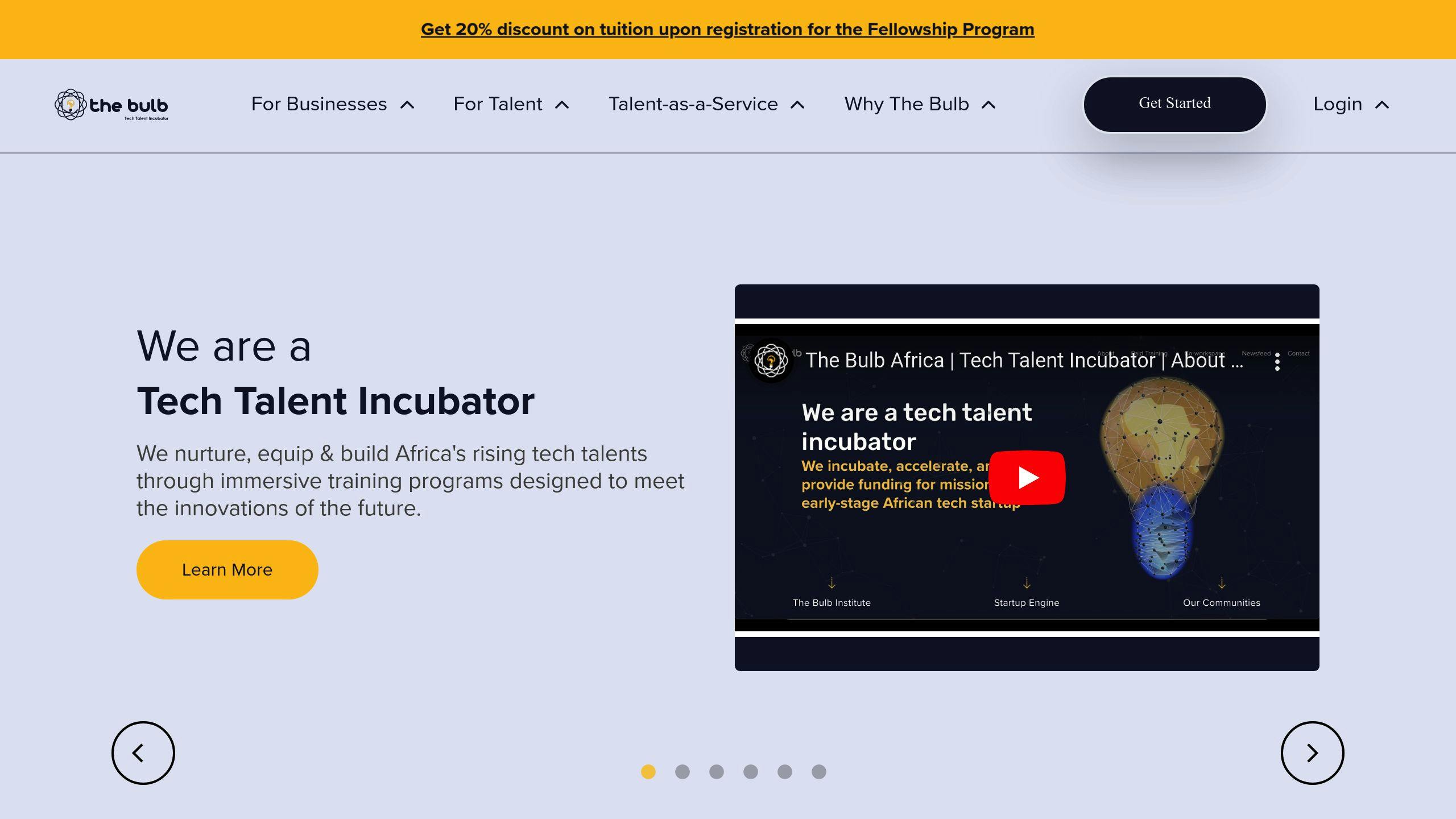African startups face tough challenges in 2025, including a 32% drop in investment, funding shortages, and regulatory hurdles. Incubators are stepping up to help.
Here’s how incubators support startups:
- Funding Help: Programs like The Bulb Africa offer seed funding and connect startups with investors.
- Mentorship: Incubators like CcHUB provide expert guidance to navigate growth challenges.
- Networking: Initiatives such as the MTN Solution Space link startups with industry players and resources.
Focus Areas in 2025:
- AI and climate tech in East Africa
- Healthcare tech in West Africa
- Fintech in Southern Africa
Incubators are also expanding to underserved regions and emphasizing sustainable growth strategies, helping startups survive and thrive in a changing landscape.
Accelerator Programs for African Startups
Key Challenges for African Startups
In 2025, African startups are grappling with several obstacles that are slowing down their growth and stability. A clear sign of these difficulties is the sharp 32% drop in investment activity, falling from $2.8 billion in 2023 to just over $2 billion in 2024 [1].
1. Funding Constraints
Securing funding has become a serious hurdle. The shutdown of companies like Copia Global, Gro Intelligence, and iProcure [1] highlights how vulnerable the ecosystem is to financial shortages. With investments shrinking, startups are moving away from rapid expansion strategies, focusing instead on tighter financial management and steady growth.
2. Regulatory and Infrastructure Barriers
Navigating complex regulations and dealing with weak infrastructure are major challenges for startups looking to scale. While some countries, like Rwanda, have introduced startup-friendly policies, many regions still lack the clarity and support needed for smooth operations and cross-border growth. Incubators often step in to help startups by providing guidance on regulations and operational strategies.
On top of these structural issues, startups also struggle to build the right networks and access specialized expertise.
3. Lack of Mentorship and Networks
The limited availability of experienced mentors and strong networks leaves many startups without the advice they need to succeed in tough markets. This often leads to:
- Poor decisions during critical growth stages
- Weak understanding of target markets
- Struggles in navigating complex business environments
These gaps emphasize the importance of incubators in providing mentorship, guidance, and support to help startups grow and thrive across Africa.
Solutions Provided by Incubators
1. Funding Assistance
Incubators in Africa play a key role in tackling the funding challenges startups face. For instance, The Bulb Africa offers structured programs that combine seed funding with business development resources to help startups grow [2]. Beyond providing seed capital, incubators assist with connecting startups to investors, refining their pitches, and offering financial guidance.
2. Mentorship Programs
Mentorship is a critical part of the support system incubators provide, addressing the lack of guidance and networking opportunities many startups encounter. Co-Creation Hub (CcHUB) is a great example, offering hands-on mentorship that helps entrepreneurs craft and implement sustainable business strategies [4]. This type of mentorship ensures startups can turn advice into actionable steps to solve real-world problems.
"Diversification is the mantra for 2025", says Samuel Okwuada, CEO and Co-Founder of Remedial Health, emphasizing how mentorship programs enable startups to explore new avenues for growth [3].
3. Market Access and Networking Opportunities
Programs like the MTN Solution Space Venture Innovation Program connect startups with key industry players, shared workspaces, entrepreneurial communities, and technical resources. Take Thrive Agric as an example. With the help of incubator support, they’ve adopted advanced technologies and launched community-driven initiatives. Their Abuja Tech Converge project shows how networking can spark collaborations and drive innovation, particularly in sectors like agriculture [3].
These efforts illustrate how incubators are closing critical gaps and paving the way for startup success across Africa.
sbb-itb-dd089af
Examples of Successful African Incubators
1. The Bulb Africa

The Bulb Africa, based in Lagos, combines innovation labs, funding opportunities, and mentorship to support startups in Nigeria’s tech space. They offer technical infrastructure and connect founders with seasoned professionals, helping startups tackle challenges related to resources and expertise [2].
2. Other Successful Incubators
MEST Africa strengthens the continent’s startup ecosystem through its entrepreneur training programs and seed funding. Operating in countries like Kenya and South Africa, it provides both physical workspaces and virtual tools to assist tech startups [5].
Here’s a quick comparison of what some key incubators offer:
| Incubator | Key Services |
|---|---|
| The Bulb Africa | Innovation Labs, Funding, Mentorship |
| MEST Africa | Training, Seed Funding, Hub Network |
| Impact Hub | Coworking Spaces, Incubation Programs |
These incubators address major challenges startups face by:
- Offering structured funding to ease financial constraints
- Providing technical resources and workspaces to overcome infrastructure issues
- Bridging mentorship gaps with expert advice and networking opportunities
Their ongoing efforts and future plans will continue to shape Africa’s growing startup landscape.
Future Developments for African Incubators
1. Reaching New Regions
African incubators are moving beyond the well-known tech hubs to support startups in areas that have traditionally been overlooked. This effort helps address the unequal distribution of resources across the continent. The African Continental Free Trade Area (AfCFTA) offers a platform for cross-border partnerships, with incubators planning strategic moves into new territories.
This expansion aims to provide startups with better access to resources and opportunities. Here’s a snapshot of regional priorities:
| Region | Focus Areas |
|---|---|
| East Africa | AI and Climate Tech |
| West Africa | Healthcare Tech |
| Southern Africa | Financial Technology |
By targeting specific needs in different regions, incubators are working to balance disparities while also refining their strategies to meet the demands of a rapidly evolving ecosystem.
2. Fresh Strategies for New Challenges
Incubators are rethinking their approaches to support startups in a changing landscape. Emphasis is being placed on creating sustainable business models and offering well-rounded support. As Samuel Okwuada, CEO of Remedial Health, puts it:
"Diversification is the mantra for 2025" [3]
Here are some of the strategies being adopted:
- Diverse Funding Options: Offering multiple funding streams to help startups handle market unpredictability.
- Tech-Driven Support: Focusing on AI and climate-related innovations to stay ahead in emerging sectors.
- Cross-Border Networks: Establishing regional partnerships through shared facilities and expert collaborations.
These shifts are especially impactful in areas like agriculture, where AI and climate tech are making a real difference [3]. By adopting these strategies, incubators are better equipped to support startups and address the broader challenges facing Africa’s startup ecosystem.
Conclusion: The Impact of Incubators on African Startups
African startups face unique hurdles, and incubators play a critical role in helping entrepreneurs overcome them. By offering more than just funding, these programs equip startups with mentorship, technical tools, and access to markets, enabling businesses to grow and thrive in challenging environments.
This support system is especially effective in driving advancements in sectors like healthcare and agriculture. By addressing specific needs, incubators help startups navigate complexities and seize opportunities for growth.
Here’s a snapshot of the current focus areas shaping incubator strategies:
| Focus Area | Key Trends |
|---|---|
| Innovation | AI and Climate Tech Integration |
| Market Access | Cross-Border Collaboration via AfCFTA |
| Growth | Balanced Expansion and Risk Management |
Incubators are tailoring their strategies to regional demands, emphasizing diversification and emerging industries like AI and climate technology. Cross-border partnerships and sustainable growth plans are fueling progress across the continent. As Ayo Arikawe of Thrive Agric notes:
"We project that the Nigerian market is back to a growth phase, and we expect to see similar growth in East Africa, with a strong focus on AI and Climate" [3]
Related posts
- Top 7 African Tech Hubs Building Communities
- 10 Reasons Why African Startups Fail
- The State of Venture Capital in Africa in 2024
- How African Incubators Support Startup Growth





